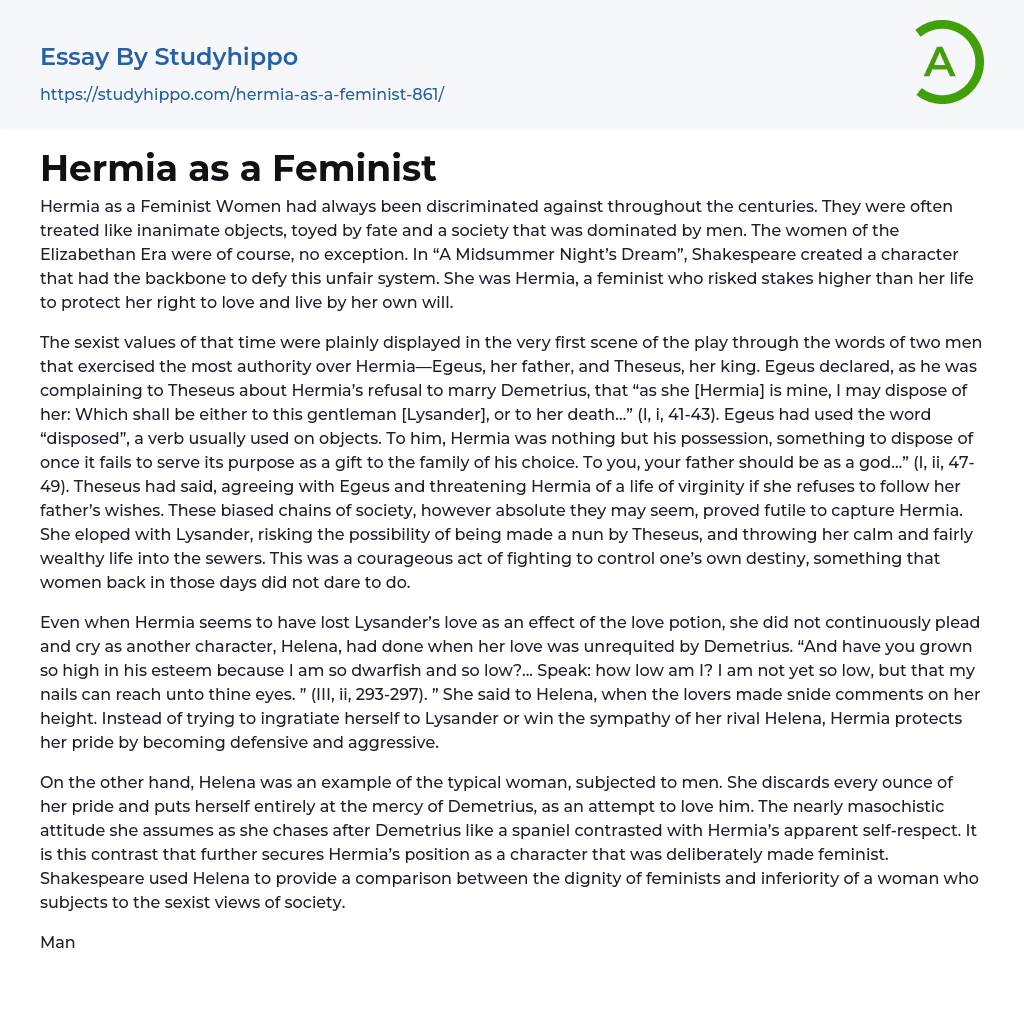Hermia as a Feminist Women had always been discriminated against throughout the centuries. They were often treated like inanimate objects, toyed by fate and a society that was dominated by men. The women of the Elizabethan Era were of course, no exception. In “A Midsummer Night’s Dream”, Shakespeare created a character that had the backbone to defy this unfair system. She was Hermia, a feminist who risked stakes higher than her life to protect her right to love and live by her own will.
The sexist values of that time were plainly displayed in the very first scene of the play through the words of two men that exercised the most authority over Hermia—Egeus, her father, and Theseus, her king. Egeus declared, as he was complaining to Theseus about Hermia’s refusal to marry Demetri
...us, that “as she [Hermia] is mine, I may dispose of her: Which shall be either to this gentleman [Lysander], or to her death…” (I, i, 41-43). Egeus had used the word “disposed”, a verb usually used on objects. To him, Hermia was nothing but his possession, something to dispose of once it fails to serve its purpose as a gift to the family of his choice. To you, your father should be as a god…” (I, ii, 47-49). Theseus had said, agreeing with Egeus and threatening Hermia of a life of virginity if she refuses to follow her father’s wishes. These biased chains of society, however absolute they may seem, proved futile to capture Hermia. She eloped with Lysander, risking the possibility of being made a nun by Theseus, and throwing her calm and fairly wealthy life into the sewers. This was
a courageous act of fighting to control one’s own destiny, something that women back in those days did not dare to do.
Even when Hermia seems to have lost Lysander’s love as an effect of the love potion, she did not continuously plead and cry as another character, Helena, had done when her love was unrequited by Demetrius. “And have you grown so high in his esteem because I am so dwarfish and so low?... Speak: how low am I? I am not yet so low, but that my nails can reach unto thine eyes. ” (III, ii, 293-297). ” She said to Helena, when the lovers made snide comments on her height. Instead of trying to ingratiate herself to Lysander or win the sympathy of her rival Helena, Hermia protects her pride by becoming defensive and aggressive.
On the other hand, Helena was an example of the typical woman, subjected to men. She discards every ounce of her pride and puts herself entirely at the mercy of Demetrius, as an attempt to love him. The nearly masochistic attitude she assumes as she chases after Demetrius like a spaniel contrasted with Hermia’s apparent self-respect. It is this contrast that further secures Hermia’s position as a character that was deliberately made feminist. Shakespeare used Helena to provide a comparison between the dignity of feminists and inferiority of a woman who subjects to the sexist views of society.
Many of Shakespeare’s female characters are courageous feminists, similar to Hermia. They are generally portrayed so that their will to resist their own fate was something to respect and look up to. Another portion of his female characters, such as Helena, are
irritating in their submissiveness. He uses these submissive characters to mock the values of the majority of women in the society of his time, who had conformed to the sexism views of men. Hermia’s actions were not only proof of her own feminist identity, but also a reflection of Shakespeare’s own feminism philosophy.
- Women's Suffrage essays
- Women'S Rights essays
- Women Empowerment essays
- Sojourner Truth essays
- A Doll's House essays
- A Midsummer Night's Dream essays
- A raisin in the sun essays
- A Streetcar Named Desire essays
- An Inspector Calls essays
- Death of a salesman essays
- Everyman essays
- Fences essays
- Hamlet essays
- Hedda Gabler essays
- Iago essays
- King Lear essays
- Macbeth essays
- Much ado about nothing essays
- Oedipus Rex essays
- Oedipus The King essays
- Othello essays
- Pygmalion essays
- Romeo And Juliet essays
- Tartuffe essays
- The glass menagerie essays
- The Importance of Being Earnest essays
- The Merchant Of Venice essays
- The Taming of The Shrew essays
- Twelfth Night essays
- Waiting For Godot essays
- John Locke essays
- 9/11 essays
- A Good Teacher essays
- A Healthy Diet essays
- A Modest Proposal essays
- A&P essays
- Academic Achievement essays
- Achievement essays
- Achieving goals essays
- Admission essays
- Advantages And Disadvantages Of Internet essays
- Alcoholic drinks essays
- Ammonia essays
- Analytical essays
- Ancient Olympic Games essays
- APA essays
- Arabian Peninsula essays
- Argument essays
- Argumentative essays
- Art essays




